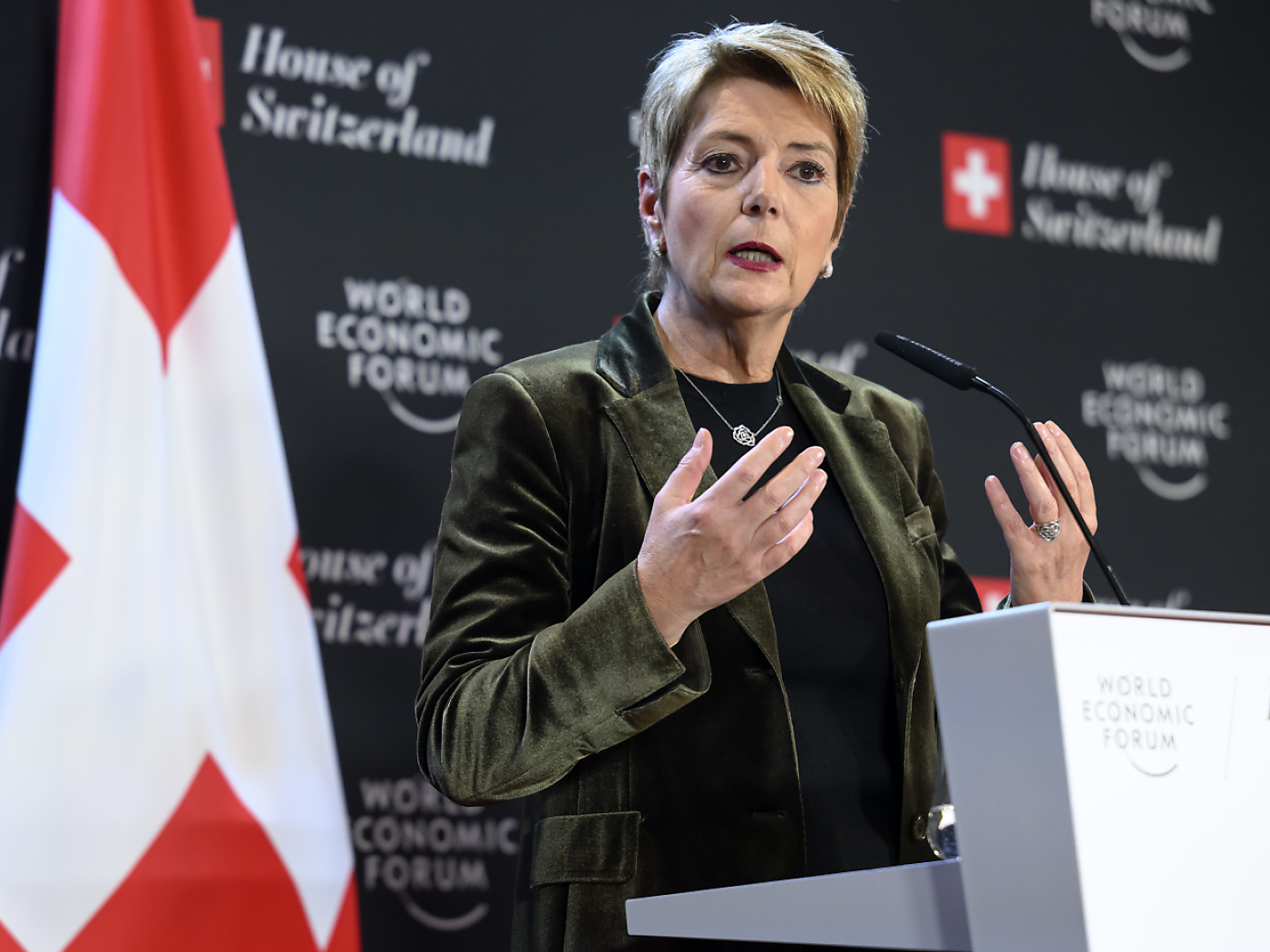Why the AfD is keen on Switzerland’s direct democracy

The far-right Alternative for Germany (AfD), which on Sunday achieved its best election result to date, has long advocated for “Swiss-style” direct democracy. What does the party hope to achieve with this?
As polls predicted, the AfD has won more than a fifth of votes in federal elections, making it the second largest political force in Germany.
Despite its rise in popularity in the 12 years since it was founded, the AfD is unlikely to play a role in government. In a nation conscious of history, other parties have consistently excluded working with a group judged – at least partly – to be situated on the extreme right, and some of whose members repeatedly use Nazi slogans.
Yet as the flurry of coverage of the AfD and its co-leader Alice Weidel in recent months have made clear, the party can’t be ignored, and neither can its policies.
Its calls for harsh asylum rules and mass deportations have dominated headlines. But its political programme also makes explicit reference to Germany’s southern neighbour. Like other right-wing populists, including those in Austria, the AfD has long called for more direct democracy – and it specifically wants to do it using Switzerland as a model.

More
Swiss papers see several hurdles ahead for winner of German elections
Germany’s ‘rich, conservative neighbour’
The AfD’s 2025 election manifesto states that the supposedly “unrestricted sovereignty of the people” has ensured Switzerland’s “prosperity, peace and freedom for almost 200 years”.
“Experience shows that decisions by citizens are more far-sighted, more peaceful and more focused on the common good than those made by professional politicians,” the manifesto writes. It calls for citizens to be able to both propose constitutional changes and challenge parliamentary laws – like in Switzerland.
However, the examples the AfD then offers for such popular votes are not Swiss. Rather, it mentions the 2016 Brexit vote in the UK and the 2005 rejection by French voters of a new constitution for the European Union (EU) – big, one-off votes in societies not used to regular referendums. Neither does the party explain the links between government, parliament, and popular votes in the Swiss system, which is often described not as a fully direct but rather as a “semi-direct” democracy.
Manès Weisskircher, a political scientist at the Dresden University of Technology, says the AfD’s calls for specifically “Swiss” direct democracy shouldn’t be over-interpreted. Knowledge of how the Swiss system works – especially the interplay between direct democracy and consensus-seeking in government – is not widespread in Germany, he says.
“The reference to Switzerland is something the AfD does because, on the one hand, it’s known that the country’s direct democratic instruments are particularly strong, and on the other hand, Switzerland is a rich and conservative country with a good image – similar to how left-wing parties like to refer to rich and progressive Scandinavia,” he says.
Other groups shy away from the issue
Meanwhile the AfD hasn’t been the only one asking for more direct democracy in Germany in the past years – most other parties, from the left-wing Greens to the liberal Free Democratic Party, have expressed at least some wish for an expansion of these rights. “We were already pushing for direct democracy when the AfD didn’t even exist, and we will continue to do so when the AfD no longer exists,” said a representative of the Left Party during a 2021 debateExternal link on the issue in parliament.

However, Weisskircher says what is interesting is how the AfD’s position has impacted other parties’ stances. In a 2023 studyExternal link, he wrote that its support for direct democracy has prompted other groups – such as the Greens – to scale back their calls for reform, or at least to become quieter about them.
As demands for more referendums have become increasingly linked to populism and the far right, and not just in Germany, the public discourse has shifted, he says. And in the current election campaign, direct democracy hasn’t been a big issue.
“One of the rare exceptions was a call by the leftist Sahra Wagenknecht Alliance for a referendum on immigration – but this was more like a desperate attempt to get media attention for a struggling campaign,” he says. Eventually the Sahra Wagenknecht Alliance failed to enter parliament by a small margin.
Ultimately, with the biggest party after Sunday’s elections – the conservative CDU/CSU alliance – having less interest in an expansion of direct democracy at the national level, it’s “very unlikely” that there’ll be any movement in the next parliament, Weisskircher says.
JD Vance’s speech in Munich
Whether German politics – or other representative democracies – could benefit from an increase in direct democratic elements is a tricky question. But the AfD isn’t the only one calling for it, or for something similar.
In his speech at the Munich Security Conference in February, US Vice President JD Vance blasted the German policy of “firewalling” the AfD, which he said amounted to “telling millions of voters that their thoughts and concerns, their aspirations, their pleas for relief are invalid or unworthy of even being considered”.
While Vance’s speech was criticised by many, Swiss Finance Minister Karin Keller-Sutter subsequently told Le Temps that his comments were at least partly a “plea for direct democracy” and a greater “integration of the population” into policymaking.

More
Swiss president downplays controversial comments on Vance speech
In Switzerland, she told RTS public television, “the fact that we have a government including four parties, that there are popular votes, and that criticism can be voiced – even against me – shows that the freedom of opinion [which Vance was concerned about] works.”
Indeed, according to a recent study by the Sotomo research group, direct democracy is seen as the most important factor for social cohesion in Switzerland – 71% of respondents said it was a key element binding the country.
In Switzerland, direct and representative democracy go together
Jakob Tanner, professor emeritus of history at the University of Zurich, tells SWI swissinfo.ch that he sees “direct democracy, under certain conditions, as the best functioning system”. However, Tanner adds, it must also be taken seriously that Switzerland appears to be “attractive to people who want to undermine fundamental rights”.
Right-wing parties often admire Switzerland because it is not a member of the EU – and, famously, a popular vote played at least a role in this situation. Tanner also explains that the right idealises the people as a “national community” that can ignore fundamental rights and international treaties. Linked to this is a debasement of the parliamentary system: even in Switzerland, the far-right Fronten movement in the 1930s dismissed parliament as a “talking shop”, he says.

More
Heated atmosphere at Swiss rally against AfD politician Alice Weidel
But for Tanner, the enthusiasm of “right-wing extremist parties throughout Europe” for Switzerland is based on a misunderstanding. Historically, there has always been an interaction between parliament and citizens’ rights in the country.
“Direct democracy in Switzerland has never been a line of attack on the representative system,” he says. Successful people’s initiatives enter into the federal constitution, but parliament legally implements – and thus shapes – them. Initiatives also have many indirect effects on the political process and promote compromise, he adds.
“This is unlike the case for Brexit, for example, where a pent-up unease with politics erupted in a poorly informed verdict,” Tanner says.
However, he notes, Switzerland must be careful not to end up on the same slippery slope, as has already happened several times in the 21st century. “The key issues are protection against discrimination, opening up to the EU and strengthening international law,” Tanner says.
Not the most mediatised issue
As for the AfD, many perceptions of the party depict it as having moved further to the right in recent years, which may also have played a role in its focus on new issues. In the party’s 2025 election manifesto, the call for “democracy based on the Swiss model” can only be found on page 130 – long after issues like the “left-wing zeitgeist”, Bitcoin, and Germany as an apparent “paradise for asylum seekers”. In its 2016 policy programme, direct democracy was the very first item on the agenda; it was also explained in a more nuanced way.
Is the party also losing interest in it? Political scientist Weisskircher isn’t convinced. Election manifestos logically focus on issues most salient for the campaign, he says. This time around, direct democracy wasn’t one of them – even though a majority of the German population favours an expansion of popular rights.
However, while the AfD “doesn’t have a particularly clear concept of how direct democracy should exactly be implemented”, he says, it has been “part of their demands since their foundation”.

More
The vote on European membership that ignited the Swiss People’s Party
Edited by Mark Livingston

In compliance with the JTI standards
More: SWI swissinfo.ch certified by the Journalism Trust Initiative










You can find an overview of ongoing debates with our journalists here . Please join us!
If you want to start a conversation about a topic raised in this article or want to report factual errors, email us at english@swissinfo.ch.